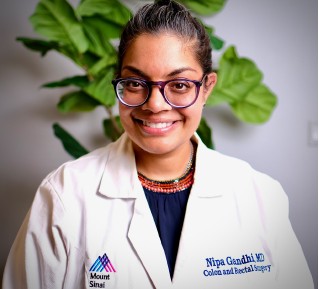Dr. Nipa Gandhi, Colorectal Surgery
Mount Sinai Hospital System: Mount Sinai West
Dr. Nipa Gandhi is a colorectal surgeon at Mount Sinai West (the former St. Luke’s-Roosevelt Hospital). Dr. Gandhi is also the surgeon who saved my life in January when I suffered a case of extreme sepsis and diverticulitis that caused my large intestine (colon) to perforate. Dr. Gandhi also happens to be considered one of the best colorectal surgeons in the city. Being the consummate journalist, I needed to know how this incredible surgeon came to be, and how her talents saved my life.
Many children in our country have a fleeting desire to become a doctor. Fewer follow through. For Dr. Nipa Gandhi, her earliest desire to become a doctor started in school and she never looked back. According to Dr. Gandhi, “Going through school and high school, the thing that really fascinated me was biology, the human body and how it really worked. It was one of the courses that I truly enjoyed. It’s something that I kind of felt just came to me naturally.” That could not be truer in my experience with her.
Knowing how accomplished she was in college and medical school, I had to understand why Dr. Gandhi, out of all the specialties she could have chosen, decided to become a colorectal surgeon. She responded, “When we do our surgical residency, it’s five years of training and we basically get to experience everything from the neck all the way down to the pelvis. I really liked colorectal surgery. When it comes to the body, it’s like plumbing and pipes, and I think the reason I chose it is there’s so much variety. I can do big abdominal cases, such as your extreme case, cancer cases and more. I can do colonoscopies, and I can also do outpatient surgery for hemorrhoids, fistulas and the like.” In other words, all Dr. Gandhi wants to do is help her patients live more productive, longer and healthier lives.
After researching the cause of my medical crisis, I had discovered that the use of ileostomy and colostomy procedures is on the rise across many subsets of gastroenterology and oncology. Not to mention the increase in colorectal issues in younger than normal people versus a generation ago. That begged the question of what the root cause of this is likely to be. Of course, Dr. Gandhi knew the answer, “The general consensus is that it has a lot to do with diet, with our environment and really what we are putting into our bodies. We are absolutely seeing younger patients who are developing colorectal cancer, who are developing diverticular disease, even inflammatory bowel disease. And we think it has to do with all the processed foods that we are now exposed to. It really was in the 70s and 80s when there were all these varieties of junk food and fast food. At the time, no one thought anything of it. So, in those early years of life, being exposed to those foods, it is now manifesting in these sorts of diseases.”

Knowing Dr. Gandhi’s expertise, and her answer as to why there is an increase in this kind of surgery, I asked her one final question as a follow up; if she had met me prior to my surgery is there something she would have recommended to me to help avoid this kind of outcome?
Her response could not have been more informative, “I think that the biggest thing I try to tell patients is that it’s not about taking foods out of your diet. Because that is just what is so challenging. That’s why so many diet fads fail. It’s really about getting more fiber and more plant-based foods into it. If all things stay equal and you know you have fast food or you know you eat some richer foods a couple of times a week or more, if you are at least using a fiber supplement like psyllium husk or Metamucil. That can help minimize the impact the effects some of these foods are having on us. Fiber helps evacuate you better, so to speak.”
Truer words could not have been spoken. I’ve always been told that fiber helps “clean the pipes” and if Dr. Gandhi is recommending this, my advice, for what that is worth to you, is to follow exactly what she says. After all, she did save my life, and that of many more.
Special thanks to Dr. Nipa Gandhi, her team and Mount Sinai Hospital for allowing us to do this interview.
To learn more about Dr. Gandhi, and Mount Sinai, please visit mountsinai.org





